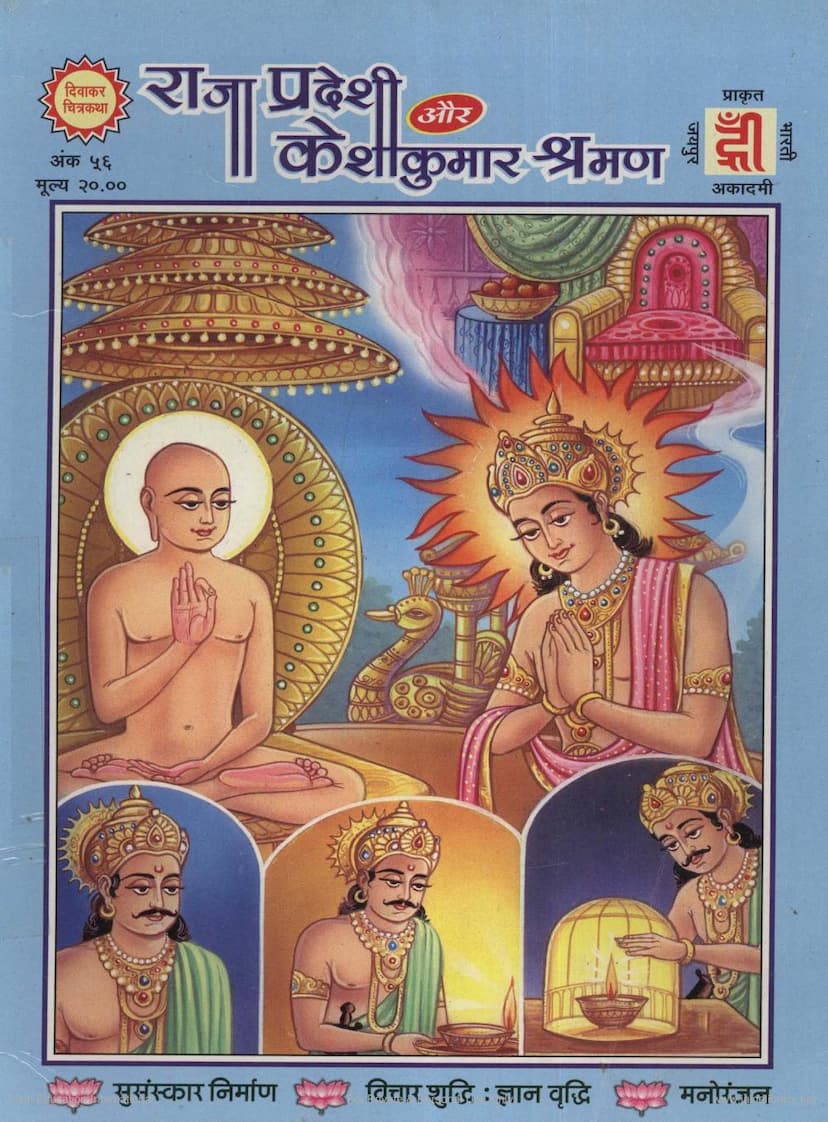Raja Pradeshi Aur Keshikumar Diwakar Chitrakatha 056
Added to library: September 2, 2025

Summary
Here is a comprehensive summary of the Jain text "Raja Pradeshi aur Keshikumar Diwakar Chitrakatha 056":
This comic book, titled "Raja Pradeshi aur Keshikumar" (King Pradeshi and Keshikumar), is part of the "Diwakar Chitrakatha" series by Shreechand Surana and published by Diwakar Prakashan. It is issue number 56, priced at 20.00.
The central theme of this story is the transformative power of good company (Satsang). The introductory pages emphasize that while tangible things like the touch of a philosopher's stone or the drink of nectar are often mythical, the influence of good company is a tangible and miraculous reality. It suggests that Satsang can change a person's life, purify thoughts, and turn sinners into saints, the cruel into compassionate, and the angry into forgiving.
The story draws from the Jain scripture Rayapaseniya, illustrating the profound transformation of King Pradeshi from a pleasure-seeking, irreligious, and cruel ruler to a devout, compassionate, and forgiving individual. This change is attributed solely to his association with the wise Jain monk, Keshikumar Shraman.
The narrative begins by introducing King Pradeshi of the ancient city of Amalakappa. He is described as an irreligious, cruel king who inflicted harsh punishments, even for minor offenses. His kingdom suffered from his tyranny. Meanwhile, King Pradeshi's minister, Chitt, was a religious, kind, clever, and principled person who was also the king's childhood friend.
The story then shifts to Suryabhdev, a celestial being in the Saudharma heaven, enjoying music and dance. He notices Lord Mahavir's preaching in the Amshal forest outside Amalakappa and is deeply moved by devotion. He descends to meet Lord Mahavir, who reveals that Suryabhdev's divine powers are a result of his past virtuous deeds, including his previous birth as King Pradeshi.
The narrative then focuses on Minister Chitt. To improve his kingdom's trade and prosperity, King Pradeshi sends Chitt to the neighboring kingdom of Shravasti. In Shravasti, Minister Chitt witnesses the teachings of Keshikumar Shraman, a disciple of Lord Parshvanath. Impressed by the monk's wisdom, Chitt accepts the layman's vows (Shravak Dharma).
Minister Chitt returns to his kingdom and continues to be influenced by Keshikumar's teachings. He persuades Keshikumar to visit their kingdom, believing that the monk's presence will reform King Pradeshi. Despite Keshikumar's initial reluctance due to the king's wickedness, Chitt manages to bring him to Amalakappa.
The core of the story unfolds when King Pradeshi encounters Keshikumar Shraman. Initially, Pradeshi is skeptical and confronts the monk with his materialistic and atheistic views, arguing that the soul and body are one and that the soul perishes with the body. He uses various arguments, including experiments with burning lamps and cutting up bodies, to prove his point. He also questions the equal existence of the soul in an elephant and an ant, and the fact that his ancestors who performed violence have not communicated with him from the afterlife.
Keshikumar Shraman patiently addresses each of King Pradeshi's arguments with logical explanations and parables. He uses analogies like the woodcutter trying to find fire within the arani wood without proper friction, or the inability to grasp air, to illustrate that some things are subtle and require specific means of understanding. He explains the concept of karma and the transmigration of the soul, emphasizing that actions have consequences that are experienced by the soul.
A key parable used is that of four merchants. Three merchants wisely discard lesser metals (iron, copper, silver) to acquire superior ones (gold, diamonds) as they encounter richer mines. The fourth merchant, however, stubbornly clings to the iron he initially collected, refusing to adapt. This parable highlights the folly of clinging to wrong beliefs and rejecting truth when it is presented.
Through these discussions, King Pradeshi's rigid, materialistic worldview begins to crumble. He gradually realizes the truth in Keshikumar's teachings about the soul's existence, its immortality, and the law of karma. He understands that the differences in beings (like the elephant and the ant) are due to the area of consciousness or the karma accumulated, not the soul itself. He accepts that his previous beliefs were misguided.
King Pradeshi undergoes a profound transformation. He releases all prisoners, forgives them, and reorganizes his kingdom's finances to be used for the welfare of the people, the poor, and ascetics. He dedicates himself to penance and self-purification.
Tragically, Queen Suryakanta, feeling neglected by the king's newfound piety, plots to kill him to install her son on the throne. She poisons his food, but King Pradeshi, understanding the karmic consequences of his past actions and maintaining his equanimity, bears the pain with immense samata (equanimity). He attributes the queen's actions to his own past misdeeds and forgives her, ultimately dying with peace and acceptance.
The story concludes by explaining that King Pradeshi's soul is reborn as Suryabhdev in the first heaven, possessing immense divine powers. After his celestial lifespan, he will be reborn in the Mahavideha region as Dridhapratijnya, eventually attaining liberation (Moksha).
The Katha Bodh (moral of the story) reinforces the lessons: the importance of self-belief, understanding the perishable nature of the body versus the eternal soul, the consequences of actions (karma), the guidance of true gurus, and the power of forgiveness and equanimity. It emphasizes that even a cruel king like Pradeshi can be transformed through Satsang and spiritual understanding.
The comic also includes additional short stories, "Hanso mat! Samjho..." (Don't Laugh! Understand...) and "Tyagi: Mahatyagi" (Renouncer: Great Renouncer), along with promotional material for subscribing to the "Diwakar Chitrakatha" series.